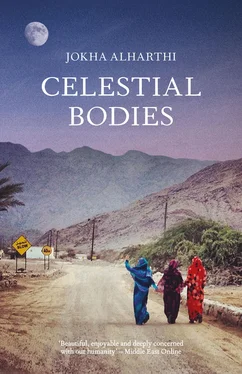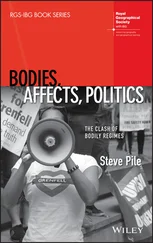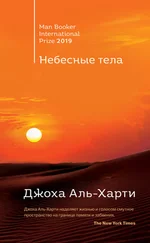When I wanted to give out alms for Muhammad’s sake, hoping he’d be cured, I went to al-Awafi and slaughtered five ewes and gave out the meat, but Maneen refused to take any of it at all. He said that if he took it and Zayid found out, he would never forgive him. The Indian woman whom Zayid brought to the house as a servant tried to help Maneen undress and clean himself. She kept at it for a few weeks but then she started spending all of her time on her own needs. When her belly swelled up enough that no one could possibly ignore her state any longer, Zayid came and got her and sent her back to her own country. Maneen returned to his old ways and his usual appearance, the cheerful dirty face, his laughter and his stone perch. His calls came now in a faded voice that was hard to hear. Or he went silent, withdrawing inside his cement house, especially whenever Zayid was in al-Awafi.
Maneen yells out: The year of the disaster, my boy! Sanat al-kharsa, it was. When the water came pouring over the land, green places and dry brown ones both. But praise be to God, we lived through it. We huddled in the tents at your papa’s place, all crowded together, and at Shaykh Masoud’s, too, dividing up the dates and the dried fish, ten to a plate. Ilhamdulillah! Heyy, Abbuud, you’re sure you don’t have a swallow of Vimto anywhere in the house? You say to me, the pension from the Ministry. Thirty riyals, Abbud, that won’t even pay for a cig, so how is it supposed to pay for the notebooks and pens Zayid needs? Hafiza! Well, you see, it costs three riyals just to give her a look. She’ll say, Go take a shower, Maneen, and then you can come to me here. May God provide for the women, they’ve got no other way. In the year of the horrible rains, my boy, the women were dying of hunger, and one of them would sell herself even for half a penny. But some of them, well, Abbud, they were a stubborn bunch, money wouldn’t do it and neither would pretty words. I brought this Hafiza a bottle of Vimto as big around as my forearm is, and she still wasn’t satisfied. She didn’t taste hunger, she didn’t see the year of the horrible rains. She’d say, Go wash yourself, go on now... Now I ask you, is Zaatar any better than me?
Years later, when his eyesight was gone and his teeth falling out, Maneen joined in at the zar exorcisms, walking over hot coals and screaming as much as he pleased. The night he was found dead, from a rifle shot to his head, he had returned from the zar very late and very drunk. For hours after he returned, he was shouting, standing there in front of the door to his house. Poor Maneen! Wretched Maneen! Give him a bite of bread, give him a half-cigarette, give him a woman even if it is only filthy Hafiza!
Some folks said he’d simply been a wretched murder victim, they even called him a martyr, and they prayed over him. But others called him an immoral drunkard and would not join the prayers. They hoisted his body and did a proper burial procession, taking him to the graveyard west of al-Awafi. When the police arrived the next morning, no one claimed to know anything. No, they hadn’t heard a thing. In a few days the case file was closed. And no one in al-Awafi saw Zayid ever again.
Teacher Mamduh taught us in all subjects. There were no girls in our class. But between classes, Zayid would steal to the first-year group where four girls studied along with the boys. He would single out one of the four, pull her hair and run off. Finally Khawla complained about him to her father Azzan. After that, he had to stop.
When we were studying the Chapter of the Back-biter from the Qur’an, Zayid would glance sidelong at me whenever we launched into reciting those particular verses: ‘Beware the back-biter, who piles up riches as he piles up the faults of others, counting his wealth and bad-mouthing others, but will his hundreds give him eternal life?’ Teacher Mamduh went into long and elaborate detail, cursing the rich and their accumulation of wealth, and the merchants who hoarded gold. All the while, Zayid’s flame-throwing glances were burning me alive. And so, on the day when Ustaz Mamduh asked us what our fathers did for a living — when he already knew perfectly well what the answers would be — I almost died of embarrassment. I didn’t have the courage to say that mine was a merchant. The boys said, easily and confidently: He’s a farmer... a blacksmith... farmer... carpenter... men’s dishdasha tailor... judge... muezzin... farmer... while I broke out in a sweat, afraid to call out that my papa was a merchant. I had the uncomfortable feeling that the word merchant meant a fat ugly disgusting person with a bulging belly which jiggled and swayed as he piled up gold and tortured the poor. I was sure that my secret as the son of a rich man — he owned what was only the second automobile in all of al-Awafi, after Shaykh Said’s — would be revealed and then I would be the butt of some truly mean taunts. Just then Zayid shouted, His papa is Merchant Sulayman! The owner of the Big House, and the farms, and his land goes all the way to Maskad.
No one mocked me but I felt ashamed, like I myself was in disgrace. I wished hard that my father was a farmer like most of the boys’ fathers were.
In the break, Zayid and I were the only boys in the class who did not go to the canteen because neither of us had any spending money. Until I reached middle school, my father was absolutely firm; there was no way he was going to give me a hundred pennies every day for school. By the time I was finally given this allowance, other people were giving their children two or three hundred. I always had to choose between bread, cheese or a carton of Suntop juice drink. I couldn’t have both or all of them at the same time. Not until the very end of high school.
Although the neon streetlamps confidently signalled the route to every house in al-Awafi, on the rough road to Masouda’s house they flickered, hesitant. Her senses picked up the grinding rasp of the rusty iron door as soon as anyone would begin pushing it open to step over the threshold. The narrow packed-dirt courtyard led one into a cramped semi-circular space and a tiny room whose door didn’t close properly. The walls were lined with images on thin, dog-eared paper of the Grand Mosque in Mecca and the Prophet’s Mosque in Medina, and one luridly coloured image in a wood frame of Buraq, the heavenly steed who carried the Prophet skyward, an elegant creature portrayed with a beautiful feminine countenance. Thin mattresses — just cheap fabric stretched over a layer of sponge — were propped against the wall next to an assortment of plastic implements: baskets of various sizes and colours, big ladles, and pots with white lids. Next to the open door was a mirror in an ancient frame at the top of which was written in pyramidal form ‘Sultanate of Muscat and Oman’. The sitting room was completely empty but for a carpet whose edges were partly worn away and a rolled-up mat that always stood in the corner. But Masouda hadn’t set foot in any of these spaces for a long time. One of the women who lived nearby might stop in at midday, or a young boy or two at sunset. As the iron door scraped open groaning, the smell that had been imprisoned inside burst out. Masouda would shout, I’m here! I’m here... and anyone around would truly know she was indeed there .
At the furthest point to the right from the courtyard was a tiny room — once used as a threshing floor — with a toilet attached which was nothing more than a crack the length of the dirt floor with a metal pitcher next to it. Ever since her daughter had announced that Masouda was mad, the old woman had been confined in the tiny room furnished only with a reed mat covering the pebbles. She improvised a makeshift window from an opening in the wall where three metal skewers formed bars and a wooden shutter hung. There was nothing in the room other than the column to which Masouda would be tied when her screams were at their loudest and she seemed almost ready to smash open the locked wooden door by throwing her body against it. Whenever she heard the low screech of the door she would grip the window bars desperately and shout, I’m in here! I’m Masouda and I’m in here!
Читать дальше












